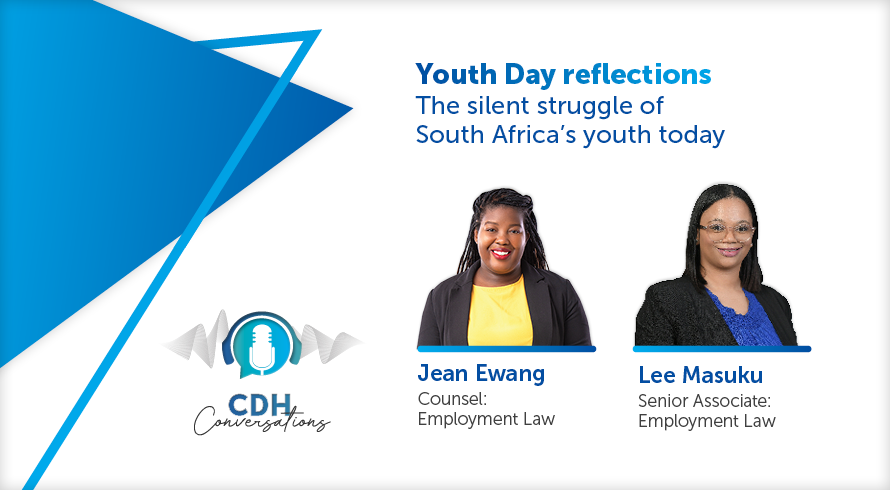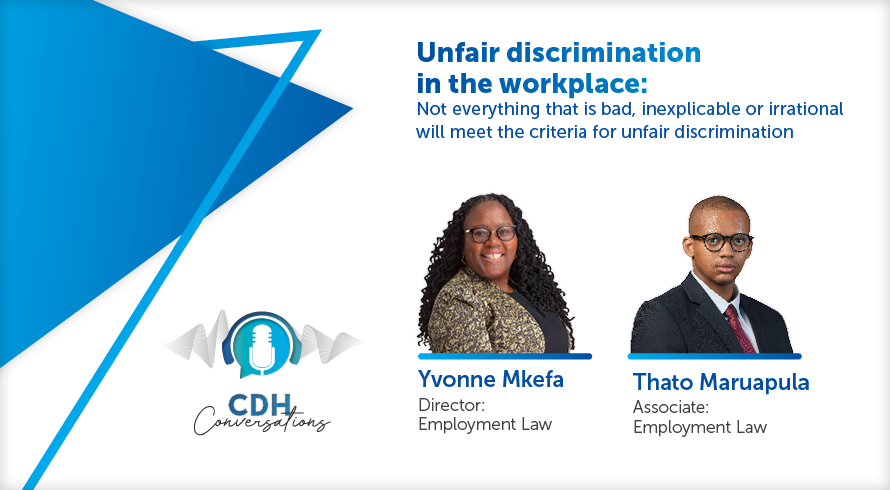The dangers business rescue and insolvency practitioners can face
At a glance
Roxanne Webster, Director in our Business Rescue, Restructuring & Insolvency sector speaks to 702 about the dangers business rescue and insolvency practitioners can face, when working on high profile cases.

The dangers business rescue and insolvency practitioners can face
Podcast
The dangers business rescue and insolvency practitioners can face
Podcast
Transcript
John Perlman on 702. Let's walk the talk.
John Perlman: Right. Let's turn to that other big and very, very important story. I've referred to the assassination of insolvency practitioner Cloete Murray, and he together with his son Thomas Murray, who works as liquidators, people in business rescue. It's possible that I'm lumping together a whole lot of terms that may not belong together. But they were assassinated and they'd been doing some important work. And some of it relates to the corruption that was outlined and unfolded in the course of the Zondo Commission of Inquiry. They had been looking into issues around Bosasa doing the work there. They were also a liquidator of Trillian Management Consulting, a subsidiary of the Gupta-linked Trillian Capital Partners.
But to get some background on all of this, we are now joined by Roxanne Webster, who's the director in the Business Rescue Restructuring and Insolvency sector at CDH. Ms. Webster, welcome and thanks very much for your time. Is it common in that area of business, given how much money is on the line and indeed just how fractious the things that precede these business rescues often are, that people doing this kind of work feel threatened? I mean, do you have colleagues who've said; "This is getting a little bit edgy. This could get dangerous"?
Roxanne Webster: Hi, John. Thanks for having me. Certainly this is a very unique situation that has happened in the industry and we are all deeply sad and devastated by the news, and given this sadness and devastation, it certainly shows you that it's not something that happens very often in our industry or at all in our industry. Cloete was a major player in the insolvency industry and well respected by many. So it's certainly not a regular occurrence within the insolvency and business rescue space.
John Perlman: What about threats? I mean, clearly and by the way, I neglected to offer condolences to you and others who knew Cloete and Thomas and please do pass those on if you can. Let's go a couple of steps back from the brutality of this assassination and the level of escalation it represents. Are threats common? Do people work under the kind of pressure that suggests that it can get personal and not just legal?
Roxanne Webster: I mean, as I mentioned, it's not very common. But what we are seeing in these recent times with the state capture and the Zondo Commission and the Gupta companies having gone into liquidation and all of those companies that you've mentioned, obviously someone needs to be appointed in order to assist in liquidating and winding up their estates.
And obviously as a liquidator, there are certain powers and duties that you have in terms of the Insolvency Act and the Companies Act. Those powers and duties are to investigate and interrogate the trade dealings and affairs of the company. So you can actually do your job as a liquidator, which is to maximize the payout for creditors.
So you as a liquidator need to investigate where the funds lie, where the funds have gone to, where are the assets. What assets need to be uncovered so you can eventually pay out the creditors? So certainly where in these types of matters where you now have some political involvement, interference, fraud, or corruption, those types of these concerns now are coming to the fore.
John Perlman: I want to understand as a process is unfolding with a business rescue practitioner's work. And I suppose this goes to what might happen next with the forensic work that they're doing. What's kind of best practice? I mean, would all the work that they've done actually have been stored? Would there be a larger team working on this? Is it reasonable to expect that despite this tragedy, the work can and will go on?
Roxanne Webster: Certainly. So let's just... there's a distinction between, liquidators and business rescue practitioners. So liquidators are when the company is being wound up, and business rescue practitioners are when we are trying to save the company.
But despite this distinction, there is a team behind both the liquidators and the business rescue practitioners in their respective fields. And that team includes all the liquidators, their team, the forensic team, the attorneys like myself. In these larger, bigger matters, there are often a host of team members that comprise of the team, and that assist the liquidator or the business rescue practitioner in fulfilling their duties. So that definitely means that the information, whatever that information may be, whatever steps need to be taken further thereafter in concluding the investigations, that can still continue.
John Perlman: My mind, Ms. Webster, went back to an incident, which is actually further back than I thought, I thought it was more recent, but actually in October 2013, Lawrence Moepi, who was director forensic services at the auditor Sizwe and Ntsaluba Gobodo was shot dead at the company's office. And much was said at the time that he was looking into issues around the arms deal. To the best of my knowledge, that matter was never resolved. The police never actually found anyone. No trial, no conviction. I know this may... but do you think the fact that that was never solved may have emboldened people 10 years later, or do you think there's no connection?
Roxanne Webster: It's difficult for me to speculate whether there's a connection or not, but I think, like we've seen with Babita Deokaran as well. I think that was also last year, the same tragic, not the same, but a tragic also killing of her where she was involved, well, I'm not connecting anything, but where she was also doing her job in the industry, and her job included investigation, fraud and corruption, etc. But I don't know how far that investigation has actually gone and whether those perpetrators have been brought to book and whether the information that she had, had actually reached where it needed to go to.
Unfortunately, there's a lot of speculation and media when it comes to the tragic event. But then it dies down very later on, so you don't actually find out, what's the connection, so the public, unfortunately cannot find out what the connection is unless the media stays on it.
John Perlman: And just finally, I mean, in the broad industry that you're part of, this is obviously meant... Because from what you're saying, it's not going to stop an investigation in its tracks. There was no documents stolen, nothing destroyed, and so on. But the conversations that have been going round on the last 48 hours, do you think some people might be saying; "You know what, this Zondo stuff, this state corruption stuff, I'd rather not touch it."
Roxanne Webster: I think that that rings true for any profession where now we included, or like I say, there's political interference or fraud or corruption.
It rings true for any of the industries and I think any of the industries having now, because it includes forensic auditors as well who have facts on that commission and have gone through the evidence, who have sighted the information that has come through those commissions. So I think it rings true for any and all industries now and it's just unfortunate now that the insolvency industry is now taking front media center with the unfortunate and devastating killing of Cloete.
But I think for all industries. It's a deep concern, but the bell should be rung for all industries and not just the insolvency industry.
John Perlman: Yes. And just finally, Roxanne, I mean, you mentioned that he was quite a giant in the space in which you work, that he's somebody you knew. I mean abiding memories of him for if somebody were to say to you, what was Cloete Murray like, and indeed his son Thomas, what would you say about them?
Roxanne Webster: I think Cloete to all of us was, as I I said, he was this giant in the insolvency industry, no nonsense type of guy. He wanted to do the best for his clients and for all the creditors, and uncover anything and everything that needed to be set straight and recovered for the entities, and the entities that he represented as liquidators.
And he was a very open guy. You could speak to him. Many of us would always give him a call if you had any insolvency related issues because he was just, he made news in the insolvency industry. He was part of most of the leading insolvency cases in the high court, the supreme court, and also in the constitutional court. So he was a very impressionable guy, very loved in the insolvency industry. And his son Thomas, now was starting to walk in his footstep, and effectively, if Cloete retired, Thomas could then step in and fulfill that role. So, as I said, it's a huge loss for the insolvency industry.
John Perlman: Thanks so much, Roxanne Webster, director in the Business Rescue, Restructuring & Insolvency sector at the law firm CDH. And once again, our condolences to you and anyone else who knew Cloete and Thomas Murray. Well, Cloete Murray was one of the many fascinating guests that joined Bruce Whitfield on the Money Show.
I'm sure Bruce will make this part of his conversation this evening. We will be talking to Bruce, by the way, in about five minute's time. But this was a particularly relevant excerpt from the conversation that Bruce had with him. I'll put up a link to that on my Twitter timeline and you can go and listen to the full interview in your own time.
But listen to this one more time.
Bruce Whitfield: Are all of the bad guys you deal with charming, particularly high profile ones, the super rich ones, the ones that make it into the headlines?
Cloete Murray: Interestingly enough, yes. With the exception of one or two individuals, but they all seem to be very charming. But I must say, you know, that charm seems to, you go away quite quickly once you start going into a conflict situation, charm disappears. And often you really see the dark side of that person. But they're all sort of charming. They all seem to be wanting to cooperate, but often that leads to the right opposite.
John Perlman: Bruce Whitfield talking to Cloete Murray on Money Show.
The information and material published on this website is provided for general purposes only and does not constitute legal advice. We make every effort to ensure that the content is updated regularly and to offer the most current and accurate information. Please consult one of our lawyers on any specific legal problem or matter. We accept no responsibility for any loss or damage, whether direct or consequential, which may arise from reliance on the information contained in these pages. Please refer to our full terms and conditions. Copyright © 2026 Cliffe Dekker Hofmeyr. All rights reserved. For permission to reproduce an article or publication, please contact us cliffedekkerhofmeyr@cdhlegal.com.
Subscribe
We support our clients’ strategic and operational needs by offering innovative, integrated and high quality thought leadership. To stay up to date on the latest legal developments that may potentially impact your business, subscribe to our alerts, seminar and webinar invitations.
Subscribe




